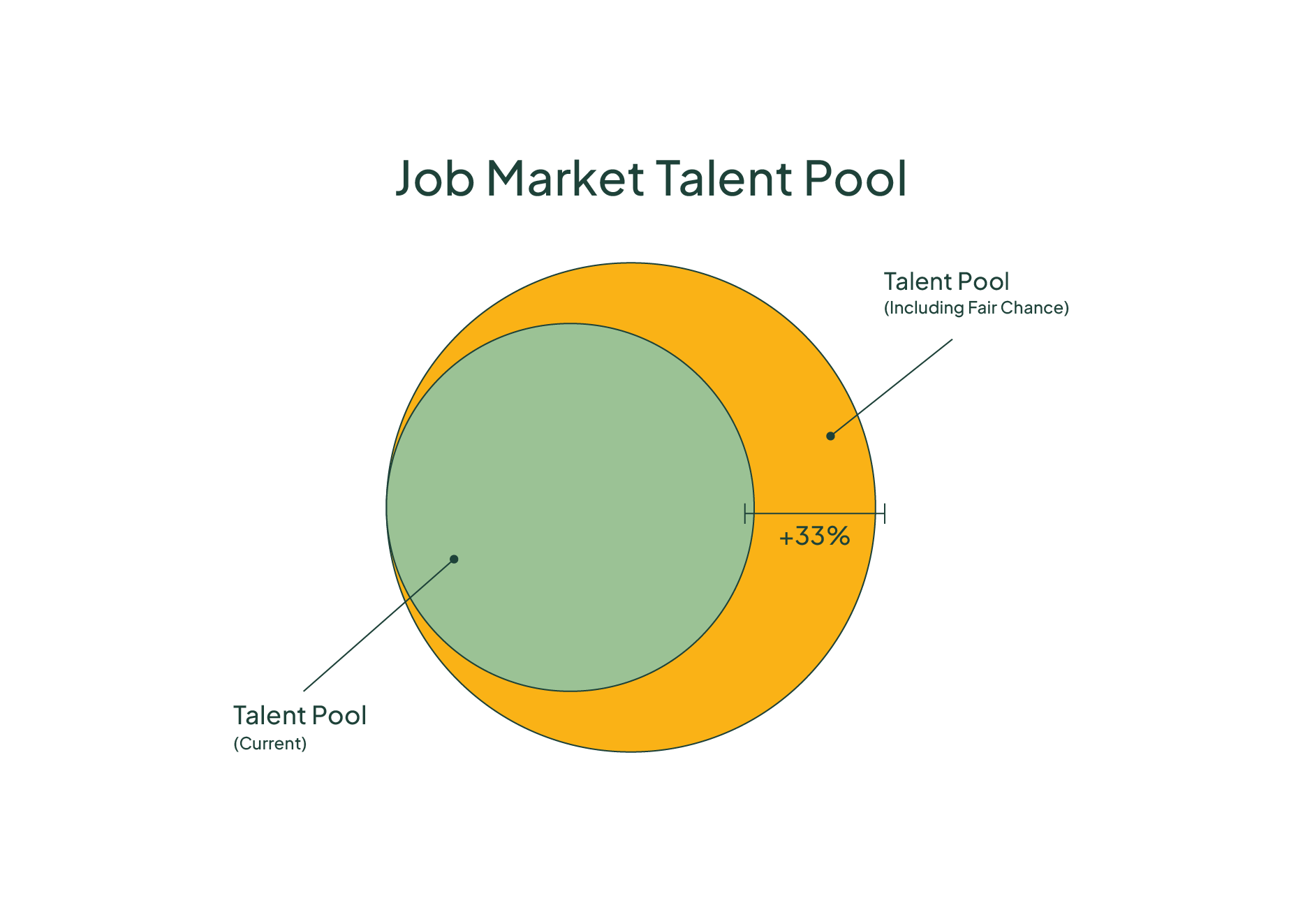Why Fair Chance Employment?
Employers facing labor shortages and low retention struggle with high turnover costs and lost productivity.
Up to 60% of formerly incarcerated people are jobless at any given time.
Fair Chance employment is the answer.
Here's how.
The Dilemma
Employee turnover is expensive. But exactly how much is it costing you?
While it is commonly acknowledged that employees are appreciating assets that produce more and provide more value to an organization over time, most companies have no framework for quantifying the cost of their turnover. The total loss can be astonishing when considering:
The cost of hiring
The cost of training and onboarding
The cost of learning and development
The cost of time/loss of production with an unfulfilled role
Not to mention the intangible costs such as the impact of high turnover on company morale.
In order to remain competitive, and arguably even viable, it is critical that companies understand the true cost of their turnover and begin to think strategically about retention.
Jobless rates among the formerly incarcerated is worse than the Great Depression.
This chart represents the “percentage of people not employed among a cohort of 51,500 people after their 2010 release from federal prisons, compared to the highest recorded U.S. unemployment rate in decades. For context, the U.S. unemployment rate in 2010, when they were released, was 9.6%.”
People of color are impacted at nearly 2x the rate of their White counterparts.
In addition, race, age and gender all have an impact on rates of unemployment among formerly incarcerated individuals. Formerly incarcerated Black women experience severe levels of unemployment, whereas white men experience the lowest. Overall, working-age “prison penalties” increase unemployment rates anywhere from 14 percentage points (for white men) to 37 percentage points (for Black women) when compared to their general population peers, according to 2018 reporting from Prison Policy Initiative.
The Solution
A supported employment ecosystem: employees thrive, companies succeed
Employment helps formerly incarcerated people gain economic stability after release and reduces the likelihood that they return to prison. This not only benefits formerly incarcerated people on an individual level, but also positively impacts society at-large. In addition, companies utilizing Fair Chance hiring practices also experience multi-prong benefits from this approach, including enhanced:
Profitability
Companies that invest in Fair Chance employment as a part of their Environmental, Sustainability, and Governance (ESG) strategy may see more profitability. Research done from 2015-2020 at the NYU Stern Center for Sustainable Business points to a growing consensus that good corporate management of ESG issues typically results in improved operational metrics such as ROE, ROA, or stock price.
Fair Chance employment also comes with a variety of positive business impacts such as dramatically reduced turnover, significant reduction in human resources staffing time, payroll tax advantages. It also can have a significant impact on general employee engagement, which in turn, vastly improves productivity. Additionally, more and more, consumer and investment dollars are being purposefully directed to companies making positive impacts. It’s becoming increasingly critical for companies to demonstrate a commitment to thoughtfulness as it relates to environmental, social and governance decisions—one of which could be the social impact of developing sustainable hiring Fair Chance hiring practices.
Stability
Between 70 million and 100 million—as many as one in three Americans—have some type of criminal record. Opening up hiring to include formerly incarcerated individuals has the potential to expand the potential talent pool by up to 33%, which is especially helpful during labor shortages.
Sustainability
Having a job has been shown to reduce recidivism, and individuals are less likely to commit crimes when they have stable, full-time employment. From a societal perspective, Fair Chance employers have a profound impact on returning citizens’ lives—an impact that also positively affects their community at large. Providing a future and stability for those who were formerly incarcerated can create a new foundation for the rest of their lives. Formerly incarcerated persons who maintained employment for one year post-release had only a 16% recidivism rate over three years as compared to a 52% recidivism rate for those who did not maintain employment.







